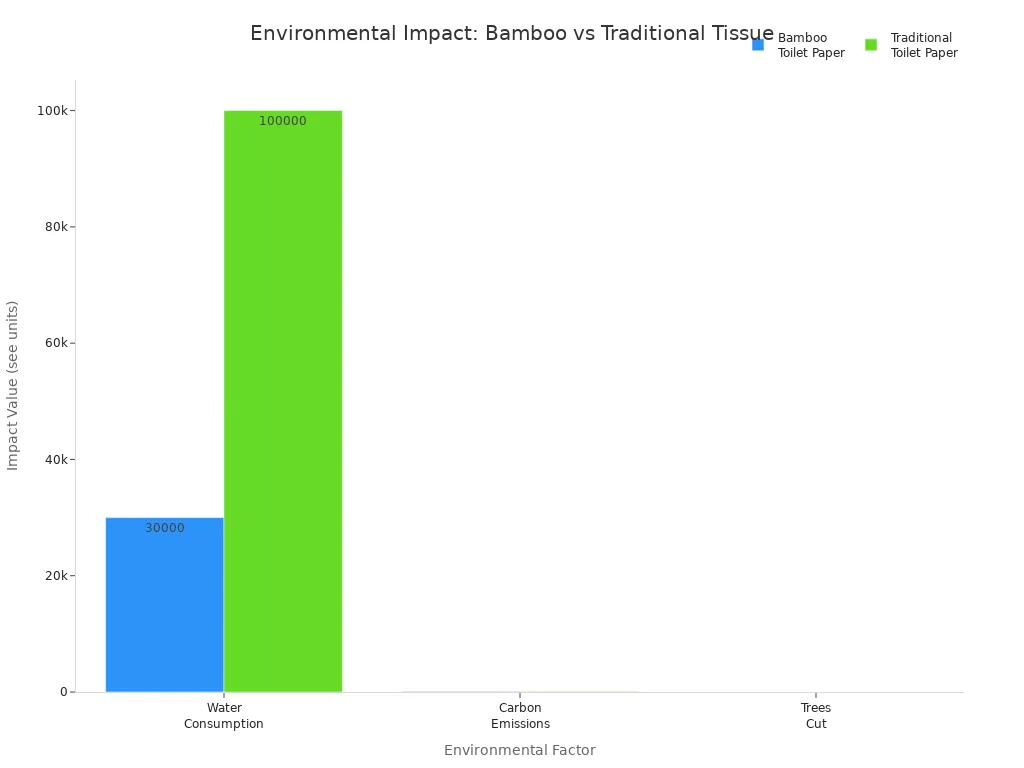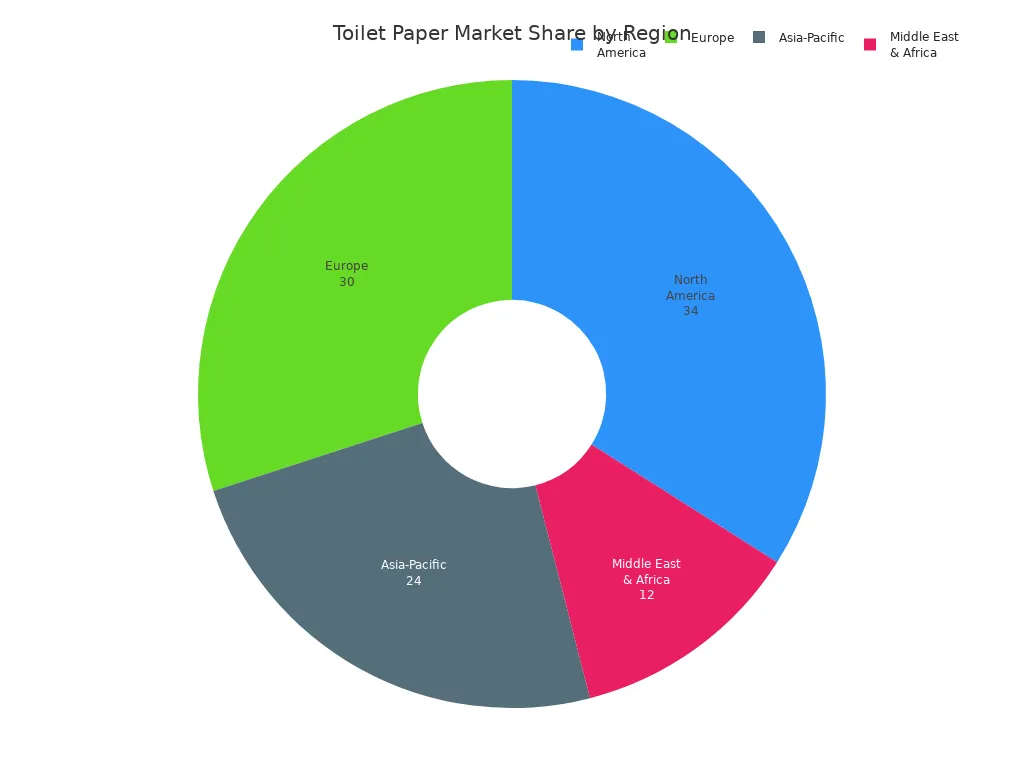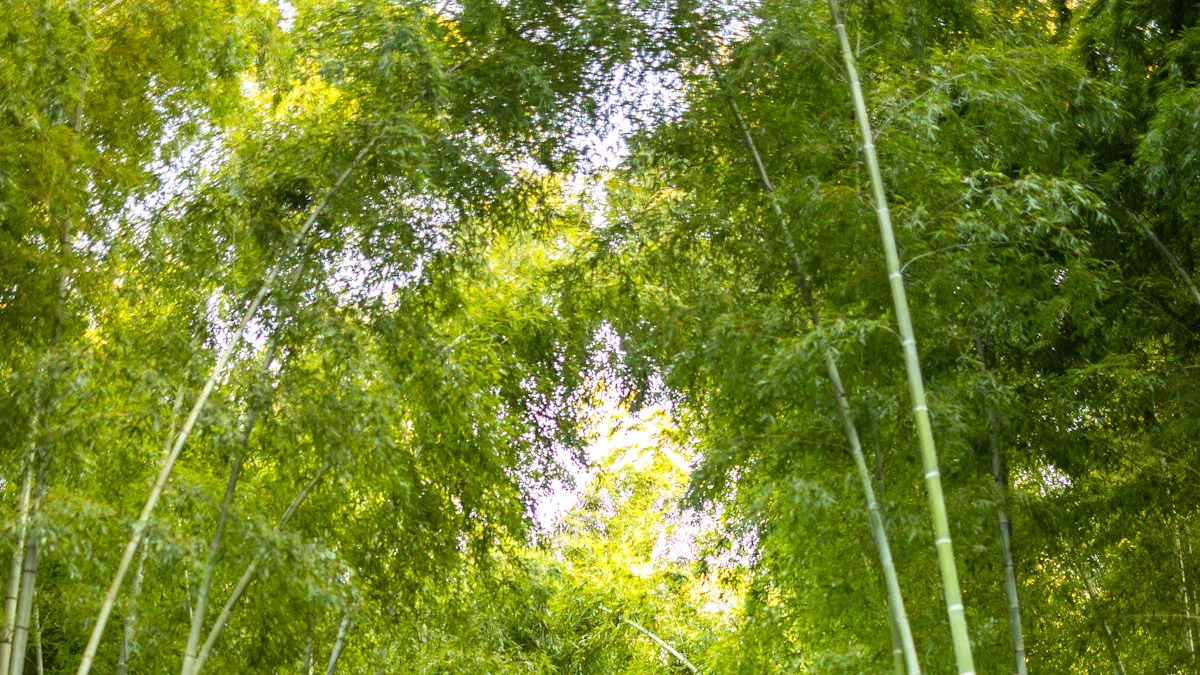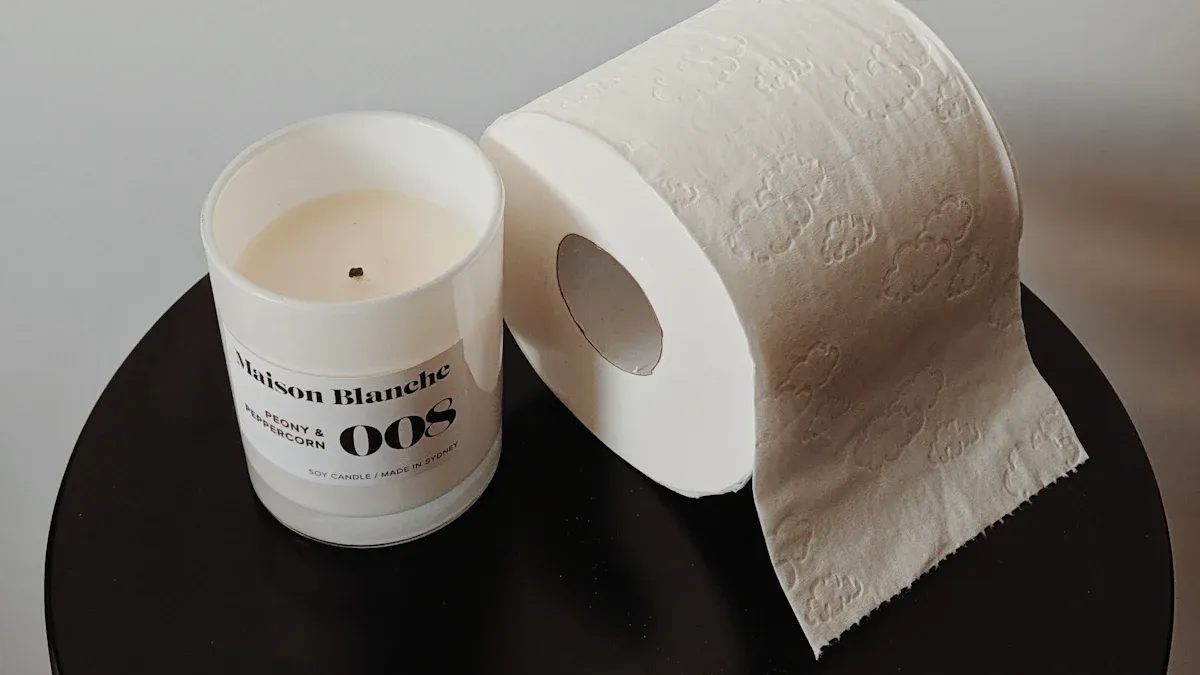Is toilet tissue biodegradable? Scientific studies show that not all toilet paper breaks down at the same rate. Bamboo toilet paper is 100% biodegradable and decomposes within weeks, while traditional toilet paper can take years. Families and individuals often choose bamboo for its quick breakdown and septic-safe qualities. Bamboo toilet paper uses less water, emits fewer greenhouse gases, and helps protect the environment. Ecolipak supports sustainability by offering eco-friendly products made from bamboo. People who care about health and sustainability find bamboo toilet paper a smart choice for their homes.

Key Takeaways
Bamboo toilet paper breaks down much faster than traditional paper, making it safer for septic systems and plumbing.
Choosing bamboo toilet paper helps protect forests, reduces water use, and lowers harmful chemical pollution.
Bamboo grows quickly without needing pesticides or replanting, making it a highly sustainable resource.
Bamboo toilet paper is gentle on sensitive skin because it contains no harsh chemicals or additives.
Look for trusted certifications like FSC and ASTM to ensure toilet paper is truly biodegradable and eco-friendly.
Is Toilet Tissue Biodegradable
What Biodegradable Means
Many people ask, is toilet tissue biodegradable? The answer depends on the materials and how the product breaks down in nature. Biodegradable means a material can decompose with help from microorganisms, turning into basic elements that do not harm the environment. Toilet paper made from natural fibers like bamboo, sugarcane, or recycled paper usually breaks down quickly and safely.
Environmental agencies such as ISO, ASTM, and OECD set standards for testing biodegradability. These organizations check how toilet paper behaves in different environments, including soil, water, and compost. Products must pass strict tests to earn certifications like FSC or Rainforest Alliance, which show they meet high environmental standards. Toilet paper with these labels comes from responsibly sourced materials and avoids harmful chemicals.
-
Breaks down easily in nature
Contains no synthetic additives or toxic chemicals
Comes from sustainable sources
Why Biodegradability Matters
Is toilet tissue biodegradable? This question matters for families and communities who care about health and the planet. Non-biodegradable toilet paper can cause serious problems. Manufacturing often leads to deforestation, loss of wildlife habitats, and high water use. Some products contain chemicals like PFAS, which can enter wastewater and harm people and animals.
Municipal studies show that biodegradable toilet paper helps wastewater treatment systems. It breaks down into fibers that can be recovered and reused, lowering energy use and treatment costs. When toilet paper has a biodegradable nature, it supports cleaner water and healthier soil. Regulatory bodies now require products to be free from bleach and synthetic additives, making true biodegradable options safer for homes and the environment.
Tip: Choosing biodegradable toilet paper helps protect forests, reduce pollution, and create a safer home for your family.
Traditional Toilet Paper
Materials and Breakdown
Traditional toilet paper comes mainly from wood pulp. Manufacturers use trees such as pine, spruce, eucalyptus, birch, gum, maple, and oak. They debark and chip the wood, then use chemicals to separate the cellulose fibers. These fibers get washed, refined, and bleached. The process creates soft and strong sheets. Most traditional toilet paper uses about 70% hardwood and 30% softwood fibers. Hardwood gives softness, while softwood adds strength. Water and chemicals help during pulping and bleaching.
When people flush traditional toilet paper, it usually breaks down in sewage systems within a few months. Moisture, oxygen, and microbes help it decompose. In landfills, the breakdown slows down. Without enough air and water, traditional toilet paper can take years to disappear. The way people dispose of toilet paper affects how fast it returns to nature.
Some brands use recycled toilet paper, which comes from post-consumer paper. Recycled toilet paper breaks down faster and uses fewer resources. Many families now choose recycled options for their homes.
Environmental Impact
The environmental impact of traditional toilet paper is large. Each year, the world spends over $41 billion on toilet paper. North America uses about 34% of the global supply, even though it has only 4% of the world’s population. The United States alone uses more than 140 rolls per person each year.

Making traditional toilet paper causes deforestation, especially in Canada and Indonesia. Clearcutting forests destroys animal habitats and harms Indigenous communities. The process uses a lot of water—about 37 gallons for each roll. Factories use chemicals like chlorine bleach, which can pollute rivers and soil. Many brands still use virgin wood pulp instead of recycled materials. Environmental groups warn that some brands link to forest destruction and climate change. Choosing recycled toilet paper or bamboo-based products helps reduce these problems and supports a healthier planet.
Note: Families can help protect forests and wildlife by choosing recycled or bamboo toilet paper for daily use.
Bamboo Toilet Paper Benefits

Fast Breakdown and Biodegradability
Bamboo toilet paper stands out for its ability to break down quickly after use. Laboratory tests from Green America show that bamboo toilet paper decomposes about four times faster than traditional toilet paper. Experts from the National Association of Wastewater Technicians report that premium bamboo toilet paper breaks down more reliably, which leads to fewer septic system service calls. Families who use bamboo toilet paper notice that it disintegrates quickly in both home and municipal systems.
The process for making bamboo toilet paper uses pulverizing and heating, not harsh chemicals. This method keeps the product safe for people and the environment. Bamboo toilet paper often uses fewer plies, which helps it break down even faster. PlantPaper’s home tests confirm that bamboo toilet paper disintegrates more completely than other premium options. Most bamboo toilet paper decomposes within a year, while conventional or recycled toilet paper can take up to three years.
Tip: Choosing bamboo toilet paper helps protect septic systems and reduces the risk of clogs. Families can enjoy peace of mind knowing their choice supports a cleaner home and environment.
Here is a simple comparison table:
Type |
Breakdown Time |
Chemical Use |
Septic Safe |
|---|---|---|---|
Bamboo Toilet Paper |
~1 year |
Low |
Yes |
Traditional Toilet Paper |
1-3 years |
High |
Sometimes |
Bamboo toilet paper is biodegradable and breaks down easily in sewage and septic systems.
The absence of harsh chemicals in processing enhances its safety and eco-friendly qualities.
Bamboo toilet paper’s fast breakdown supports cleaner water and healthier soil.
Sustainability of Bamboo
Bamboo offers unique sustainability advantages for toilet paper production. Agricultural studies show that bamboo grows rapidly, maturing in three to five years. This fast growth rate reduces pressure on forests and helps prevent deforestation. Bamboo is the fastest growing plant, sometimes reaching up to one meter per day. Farmers can harvest bamboo frequently without harming the environment.
Bamboo cultivation helps the planet in several ways:
Bamboo sequesters large amounts of carbon dioxide, up to 17 tonnes per hectare each year.
Its root system protects soil, prevents erosion, and improves water retention.
Bamboo requires minimal water and no pesticides, which reduces chemical runoff and conserves resources.
Bamboo toilet paper production uses up to 90% less land per sheet than traditional tree-based toilet paper.
Bamboo regrows from its roots after harvesting, similar to mowing grass, so replanting is not needed.
Scientific studies highlight bamboo’s positive effects on soil conservation and water retention. Bamboo plantations contribute to ecological sustainability, especially when managed properly. Bamboo’s efficient pulping process lowers environmental impact and reduces reliance on fossil fuels.
Note: Families who choose bamboo toilet paper help save forests, reduce carbon emissions, and support eco-friendly farming practices.
Bamboo’s natural resilience means farmers use fewer fertilizers and pesticides. Bamboo thrives in poor soils, helping restore landscapes and reduce erosion. The plant’s rapid growth and ability to return nutrients to the soil make bamboo toilet paper a smart choice for those who care about sustainability and environmental health.
Ecolipak Bamboo Toilet Paper
Product Features and Safety
Ecolipak’s 2-Ply Tree Free Bamboo PFAS-Free & BPA-Free Soft Eco Toilet Paper stands as a leading example of eco-friendly and non-toxic toilet paper. This product uses 100% bamboo, which means no trees are harmed during production. The bamboo toilet paper is PFAS-Free, BPA-Free, and chemical-free, making it a safe choice for families who care about health. Ecolipak avoids harsh bleaching, so the toilet paper remains unbleached and gentle on skin. The hypoallergenic nature of bamboo toilet paper makes it suitable for people with sensitive skin or allergies. Each roll is septic safe, so it will not harm plumbing or septic systems. Ecolipak’s commitment to sustainability shows in every detail, from the use of renewable bamboo to the absence of harmful chemicals. The company has protected over 125,000 square meters of green space by selling more than 59 million eco-friendly products in 2024. Ecolipak’s mission focuses on providing safe, sustainable, and high-quality products for every home.
Comfort and User Experience
Bamboo toilet paper from Ecolipak offers a soft and comfortable experience. Many users praise its gentle touch and absorbency. The 2-ply design provides a balance between softness and strength. Some users mention that the layers can separate, but most agree that the comfort and effectiveness stand out. The roll size is smaller than some traditional toilet paper brands, yet the quality of the bamboo toilet paper makes it a favorite among eco-conscious families. People appreciate that this non-toxic toilet paper is both safe and effective. Ecolipak bamboo toilet paper supports a healthy lifestyle while protecting the environment.
-
Users highlight the following:
Softness and absorbency receive high marks.
Comfort is consistently praised.
Some note the roll size is smaller, but the eco-friendly benefits outweigh this.
The product is a top choice for those seeking sustainable and non-toxic options.
Ecolipak continues to lead in sustainability by offering bamboo toilet paper that meets the needs of modern families. The brand’s focus on health, comfort, and environmental responsibility makes it a smart choice for anyone who values both personal well-being and the planet.
Bamboo vs. Traditional Toilet Paper

Biodegradability Comparison
Bamboo toilet paper breaks down much faster than traditional toilet paper. Plumbing industry reports show that bamboo toilet paper dissolves in water within seconds or minutes. This rapid breakdown helps prevent clogs and keeps septic systems running smoothly. Plumbers often recommend bamboo toilet paper for homes with septic tanks because it reduces the risk of blockages. Traditional toilet paper, made from wood pulp, can take several minutes to dissolve and sometimes accumulates in pipes, leading to plumbing issues.
A simple test involves shaking squares of bamboo toilet paper in water. The paper quickly falls apart into tiny pieces, showing its septic safety. Most clogs come from pipe problems, but bamboo toilet paper’s fast breakdown makes it a safer choice for families. The table below highlights the differences:
Feature |
Traditional Toilet Paper |
Bamboo Toilet Paper |
|---|---|---|
Material |
Wood pulp |
Bamboo pulp |
Breakdown Time in Water |
Under 1 minute |
|
Septic System Suitability |
Sometimes safe |
Yes |
Risk of Clogging |
Higher |
Lower |
Tip: Choosing bamboo toilet paper helps protect plumbing and keeps septic systems healthy.
Environmental and Health Benefits
Bamboo toilet paper offers strong environmental and health advantages. Bamboo grows quickly and reaches maturity in just a few years. Farmers do not need to replant bamboo after harvesting because it regrows from its roots. This process prevents soil erosion and keeps the land healthy. Bamboo uses less water than trees and does not require pesticides or chemical fertilizers, which helps protect rivers and soil.
Families who switch to bamboo toilet paper help reduce carbon emissions. Bamboo forests absorb more carbon dioxide than many tree species. The production of bamboo toilet paper creates fewer greenhouse gases and uses less energy. Lifecycle studies show bamboo toilet paper has a smaller environmental footprint than traditional toilet paper.
Health experts recommend bamboo toilet paper for sensitive skin. Bamboo fibers are naturally antibacterial and hypoallergenic. The paper does not contain harmful chemicals like PFAS, BPA, chlorine, bleach, dyes, or fragrances. These chemicals can cause skin irritation and allergic reactions. Bamboo toilet paper feels soft and gentle, making it a better choice for people with skin conditions.
Note: Bamboo toilet paper supports a cleaner environment and healthier families. Its natural properties help protect both the planet and personal well-being.
Choosing Biodegradable Toilet Paper
What to Look For
Families searching for sustainable household paper products should pay close attention to labels and certifications. Many brands use terms like “eco-friendly” or “green,” but these words can be misleading without proof. Regulatory agencies warn that some packaging claims “tree-free” or “100% bamboo” even when the actual bamboo content is much lower. Some products highlight recycled materials, but the main ingredient may still be virgin wood pulp.
Consumer advocacy groups recommend looking for these certifications:
Green Seal certification for strict environmental criteria
Fair Trade certification for ethical sourcing and fair wages
Forest Stewardship Council (FSC) certification, which ensures responsible forest management and supports biodiversity
Tip: Always check for real certifications, not just green packaging or vague claims. FSC-certified bamboo toilet paper supports ethical and sustainable practices.
A table can help compare what to look for:
Label/Certification |
What It Means |
|---|---|
FSC |
Responsible forestry, biodiversity |
Green Seal |
Strict environmental standards |
ASTM |
Verified compostability/biodegradability |
Fair Trade |
Ethical production and fair wages |
Why Bamboo Is a Smart Choice
Bamboo toilet paper stands out as an eco-friendly alternative for families who want to make an eco-friendly choice. Experts highlight several reasons:
Bamboo grows very fast, sometimes up to 35 inches per day, and does not need replanting.
Bamboo requires less water and no pesticides, making it a renewable resource.
Bamboo toilet paper is naturally hypoallergenic, chemical-free, and gentle on sensitive skin.
Most bamboo toilet paper brands use plastic-free, recyclable packaging.
Bamboo toilet paper breaks down quickly in water, making it safe for septic systems.
Choosing bamboo helps reduce the demand for tree-based paper and lowers greenhouse gas emissions.
Market research shows that while bamboo toilet paper may cost more per roll, buying in bulk can make the cost per sheet similar to traditional or recycled options. Over time, families can enjoy both environmental and health benefits without a big increase in household expenses.
Note: Switching to bamboo toilet paper means supporting a cleaner planet and a healthier home. It is a simple step that makes a big difference for future generations.
Recent studies show that choosing biodegradable toilet paper helps protect the environment. Families who switch to Ecolipak’s bamboo toilet paper enjoy a safe and comfortable product. The toilet paper is free from harmful chemicals and supports healthy skin. Its packaging is recyclable, which helps create a cleaner home. Ecolipak’s commitment to sustainability inspires people to make responsible choices. For more information and product options, visit Ecolipak’s website.
FAQ
What makes bamboo toilet paper an eco-friendly alternative?
Bamboo toilet paper comes from the fastest growing plant. Farmers harvest bamboo without harming forests. This eco-friendly choice helps reduce environmental impact. Families who use bamboo toilet paper support sustainability and protect the environment.
Is toilet tissue biodegradable, and how does bamboo compare?
Toilet paper made from bamboo has a biodegradable nature. It breaks down faster than traditional toilet paper. Bamboo toilet paper supports septic systems and helps keep water clean. This makes it a smart eco-friendly alternative for homes.
Can bamboo toilet paper help sensitive skin?
Bamboo toilet paper is a non-toxic toilet paper. It contains no harsh chemicals. People with allergies or sensitive skin often choose bamboo toilet paper. Its soft texture and hypoallergenic properties provide comfort and safety for families.
How does bamboo toilet paper affect the environment compared to recycled toilet paper?
Bamboo toilet paper has a lower environmental impact than recycled toilet paper. Bamboo grows quickly and needs less water. Recycled toilet paper uses old paper, but bamboo supports sustainability and reduces the need for chemicals.
What should families look for when choosing sustainable household paper products?
Families should check for certifications like FSC. Labels show products are eco-friendly and support sustainability. Choosing bamboo toilet paper or recycled options helps protect the environment and promotes healthy living.





